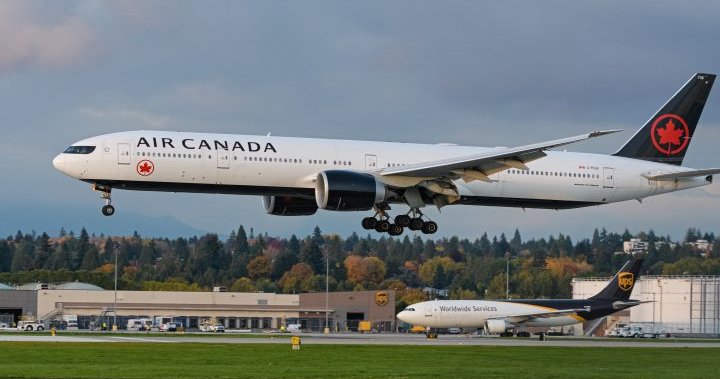Air Canada has suspended more than 800 employees for not being fully vaccinated against COVID-19 in line with federal rules.
The vast majority of Air Canada’s 27,000 cabin crew, customer service agents and others have received both shots, chief executive Michael Rousseau said Tuesday.
Read more:
Air Canada revenue nearly triples from last year as airline ramped up capacity
“Our employees have done their part, with now over 96 per cent fully vaccinated. The employees who are not vaccinated or do not have a medical or other permitted exemption have been put on unpaid leave,” he said on a conference call with investors.
The layoffs are “across the company” rather than concentrated in any particular job, spokesman Peter Fitzpatrick said in an email.
The proportions align with those at WestJet Airlines Ltd., where fewer than four per cent of workers – less than 300 out of 7,300 – are unvaccinated, the company said in an email.
Prime Minister Justin Trudeau announced last month that as of Oct. 30, Ottawa would require federally regulated air, rail and shipping companies to establish mandatory vaccination policies for employees.

Air Canada sees hope on the horizon as revenues soared over 2020 levels last quarter amid stronger sales for winter, despite continuing to operate far below pre-pandemic capacity and at a loss of hundreds of millions of dollars.
Domestic leisure bookings have bounced back, prompting a recall of more than 10,000 laid-off employees since the start of the year – 6,500 of them since July. But business travel remains down across the board due in part to the persistence of remote work, executives said Tuesday.
Read more:
Canadian airlines adding flights, capacity in bid to recover COVID-19 losses
“We’re witnessing a strong rebound in VFR (visiting friends and relatives), and leisure traffic remains strong, specifically within North America, across the Atlantic and to sun destinations,” chief commercial officer Lucie Guillemette said on the conference call.
“We were pretty confident that come 2022 corporate Canada returns to their offices and business travel should return. But no doubt that for us, business has lagged a little bit.”
Revenue nearly tripled year over year to $2.10 billion in the quarter ended Sept. 30, beating expectations by more than 15 per cent, according to according to financial markets data firm Refinitiv. Capacity also increased by 87 per cent.
But revenue fell more than 60 per cent short of Air Canada’s third-quarter figures in 2019 while capacity remained two-thirds below, as COVID-19 fallout continues to dent carriers’ bottom lines.

“There’s no textbook on this type of recovery, or any in the history. There’s no doubt we’re very encouraged by what we see. And there’s no doubt that the length of the recovery has moved in from the consensus of 2025 to at least 2024 and maybe 2023,” said Rousseau, who took over as CEO in February.
In its outlook, the Montreal-based airline said it plans to expand its fourth-quarter capacity by about 135 per cent compared with the same period in 2020. However, that capacity _ calculated using an industry metric called available seat miles _ will barely reach half the amount of its pre-pandemic level.
Read more:
Air Canada introduces COVID self-testing option for customers
Net cash flow of $153 million was well above analyst expectations of cash burn of up to $460 million. It marked the first quarter Air Canada has enjoyed cash flow in the black since the onset of the pandemic.
Rousseau also stressed a record cargo performance of more than $1 billion so far this year. The carrier began to shift toward air freight last spring, converting several of its retired Boeing 767 jetliners to cargo aircraft.
With fewer flights and less freight being transported in the luggage compartments of passenger planes, the price of shipping cargo by air has increased. Other airlines such as American Airlines and United Airlines also began operating cargo-only last year, hoping to use the opportunity to stem their losses.
Air Canada reported a loss of $640 million in its third quarter compared. The loss amounted to $1.79 per diluted share last quarter compared with a loss of $685 million or $2.31 per diluted share a year earlier.
Analysts had expected a loss of $554.7 million, or $1.44 per diluted share, according to Refinitiv.
© 2021 The Canadian Press














































